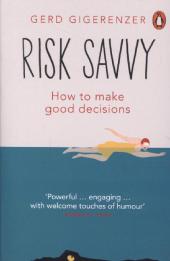 Neuerscheinungen 2015Stand: 2020-02-01 |
Schnellsuche
ISBN/Stichwort/Autor
|
Herderstraße 10
10625 Berlin
Tel.: 030 315 714 16
Fax 030 315 714 14
info@buchspektrum.de |

Gerd Gigerenzer
Risk Savvy
How to make good decisions
2015. 336 S. 198 mm
Verlag/Jahr: PENGUIN UK 2015
ISBN: 0-241-95461-4 (0241954614)
Neue ISBN: 978-0-241-95461-4 (9780241954614)
Preis und Lieferzeit: Bitte klicken
A fascinating, practical guide to making better decisions with our money, health and personal lives from Gerd Gigerenzer, the author of Reckoning with Risk.
Numbers don´t lie - but they often mislead us. From health risks to financial decisions, we often find it hard to make decisions because the statistics have been presented to us by ´experts´ who misinterpret the data themselves. Here Gerd Gigerenzer shows how we can all use simple rules to become better-informed, risk-savvy citizens.
´Important, Gigerenzer draws valuable lessons . . . his clear explanations will be a great help to all´ Omar Malik, Times Higher Education
´Gerd Gigerenzer argues that when it comes to taking risks in life, we are often much better off following our instincts than expert advice´ Oliver Burkeman, Guardian
´Things will only get better, he shows, when specialists, particularly doctors and investment advisers, improve on their appalling record of analysing and communicating risks in their fields´ Clive Cookson, Financial Times, Books of the Year
´Gigerenzer is brilliant´ Steven Pinker
Gerd Gigerenzer is Director of the Center for Adaptive Behavior and Cognition at the Max Planck Institute for Human Development in Berlin and former Professor of Psychology at the University of Chicago. He is the author of several books on heuristics and decision making, including Reckoning with Risk.
Gerd Gigerenzer ist der in Wissenschaftskreisen derzeit meistzitierte deutsche Psychologe. Nach Lehrtätigkeiten in Konstanz, Salzburg und Chicago ist er heute Direktor am Max-Planck-Institut für Bildungsforschung in Berlin, wo er den Bereich Adaptives Verhalten und Kognition leitet. Dort erforscht er u. a. Risikoverhalten und -kommunikation, die Natur sozialer Intelligenz und schließlich, wie Menschen mit begrenzter Zeit und begrenztem Wissen Entscheidungen treffen. Seine Forschungsarbeit ist interdisziplinär und berührt die Fachrichtungen Ökonomie, Informatik, Psychologie, Mathematik, Anthropologie und Biologie.
Er hat zahlreiche internationale Auszeichnungen erhalten, so auch den Preis der renommierten American Association for the Advancement of Science (AAAS)


